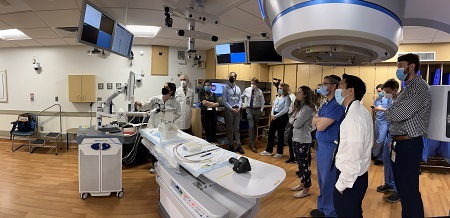Curriculum
Thirty-four to 36 of the 48 months of residency will be spent in required core clinical rotations. The remaining months will be used for elective time and laboratory or clinical research. Ten months are dedicated for professional development time/ research for third year residents with the option to extend to 12 months. This may be used for research, either clinical or basic. Alternatively, this time can be utilized for advancing other domains of knowledge either within radiation oncology or for other areas such as palliative care or population health.
Teaching Format
 Teaching is carried out through didactic lectures, clinics and numerous teaching conferences, with emphasis on patient care, under the supervision of full-time faculty. Elective time is spent in related oncological specialties to promote the multidisciplinary concept of managing cancer patients. The department enjoys state-of-the-art equipment and operates several sites both on- and off- campus, which include: a main facility in the Gudelsky Tower of the University of Maryland Medical Center, the Maryland Proton Treatment Center (MPTC) in downtown Baltimore, the Central Maryland Radiation Oncology center in Columbia, the Kaufman Cancer Center at UM Upper Chesapeake Health in Bel Air, the Tate Cancer Center at UM Baltimore Washington Medical Center in Glen Burnie, and the Requard Radiation Oncology Center at UM Shore Regional Health in Easton. The majority (90%) of training is completed at UMMC and MPTC with select rotations at community sites.
Teaching is carried out through didactic lectures, clinics and numerous teaching conferences, with emphasis on patient care, under the supervision of full-time faculty. Elective time is spent in related oncological specialties to promote the multidisciplinary concept of managing cancer patients. The department enjoys state-of-the-art equipment and operates several sites both on- and off- campus, which include: a main facility in the Gudelsky Tower of the University of Maryland Medical Center, the Maryland Proton Treatment Center (MPTC) in downtown Baltimore, the Central Maryland Radiation Oncology center in Columbia, the Kaufman Cancer Center at UM Upper Chesapeake Health in Bel Air, the Tate Cancer Center at UM Baltimore Washington Medical Center in Glen Burnie, and the Requard Radiation Oncology Center at UM Shore Regional Health in Easton. The majority (90%) of training is completed at UMMC and MPTC with select rotations at community sites.
There are many intradepartmental and interdepartmental conferences and tumor boards to attend. It is essential to the success of our teaching program that our residents attend all departmental conferences and all interdepartmental conferences appropriate for each rotation. They are designed to teach all levels of trainee, and accomplish important patient care functions on a daily basis. Residents are blocked from clinical duties during all teaching conferences.
We have 22 members of the clinical faculty in the Department of Radiation Oncology, including 15 full-time and 7 part-time faculty, all of whom are invested in the residency program.
Click here for a Sample Teaching Conference Schedule
A few highlights from our teaching format include the following:
- Attending lectures
- Clinical talks (topic-based)
- Case presentations (focused on background/workup or on management of disease)
- Visiting Professors (four to six per year)
- Dedicated mock orals
- Guest attending lectures
- Morbidity and mortality conferences
- Journal Club (clinical and biological)
- Patient Centered Communication (PEP) workshops
- Physics lecture series
- Radiation biology lecture series
- Designated biostatistics sessions (1x/ month)
- Technology rounds
- Hands-on brachytherapy workshop
- Hands-on hyperthermia workshop
- Simulation workshop such as fiberoptic flexible nasopharyngoscopy at the MASTRI Center
- Jeopardy (board-exam style questions as content)
